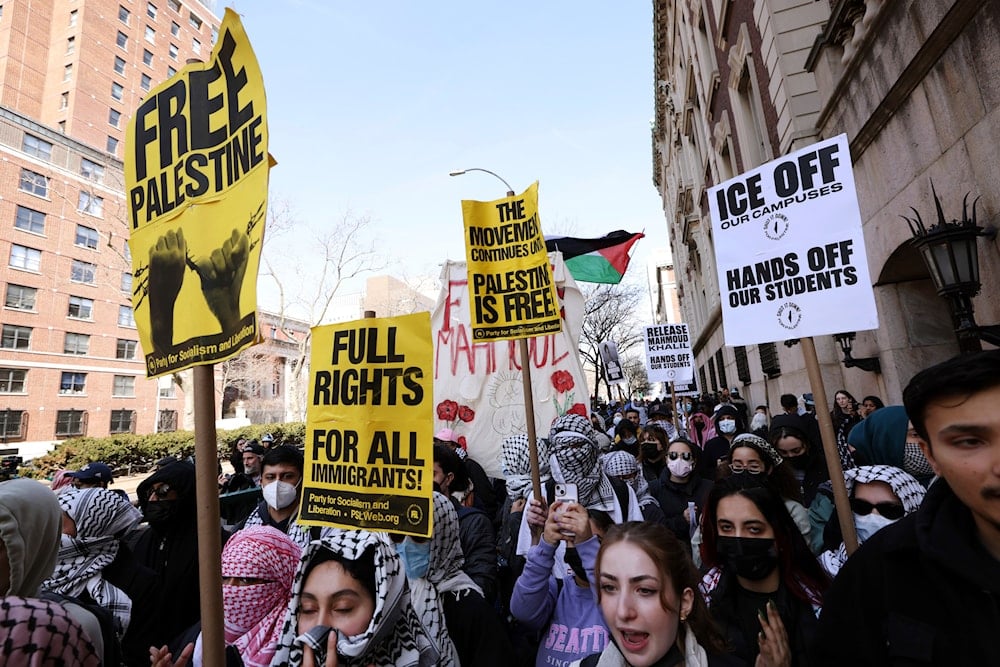Columbia suspends over 65 Students following pro-Palestine protest
Over 65 students have been suspended by Columbia University after a Gaza solidarity protest at Butler Library, calling for divestment from "Israel" and renaming the space after Bassel al-Araj.
-

Protesters rally in support of detained Palestinian activist Mahmoud Khalil outside Columbia University in New York on Friday, March 14, 2025 (AP)
Columbia University has suspended more than 65 students after a pro-Palestinian demonstration unfolded inside Butler Library, the university’s central academic space.
The protest, which occurred on Wednesday, resulted in 80 arrests, as confirmed by university officials on Friday, and now places the students under “interim suspension” as investigations proceed.
Alongside these suspensions, 33 individuals affiliated with other schools have been prohibited from accessing the Morningside Heights campus, while alumni who participated in the demonstration have also been subjected to access restrictions.
Koufiyyehs, banners, and bullhorns
Protesters entered the building wearing koufiyyehs as they confronted university security and transformed the space into what they named the "Bassel al-Araj Popular University" in tribute to the Palestinian intellectual and resistance figure.
Standing atop desks and using bullhorns to voice their demands, the protesters rallied around a prominent banner that read “Strike for Gaza,” while distributing pamphlets urging the university to divest from companies profiting from "Israel’s" military aggression on Gaza.
Footage circulating on social media showed moments of tension as security forces clashed with demonstrators, amplifying public scrutiny of the university’s handling of the situation.
In a public statement, Columbia University Apartheid Divest (CUAD) affirmed their stance by stating, “We will not be useless intellectuals… Palestine is our compass,” reiterating their commitment to challenging institutional complicity.
Columbia, Trump admin. crack down on pro-Gaza protests
As administrative pressure intensified, Columbia University authorized the presence of federal immigration agents on campus, a decision that raised alarm among students and rights groups alike.
The administration defended the move by citing disruptions to the university’s academic atmosphere and policy violations, though critics argued the crackdown was disproportionate and politically motivated.
Amid the fallout, accusations of antisemitism were leveraged by American officials aiming to frame pro-Palestinian activism as discriminatory.
Acting Columbia President Claire Shipman echoed these concerns, stating the university “unequivocally rejects anti-Semitism and all other forms of harassment,” a narrative that some viewed as an attempt to delegitimize the core message of the protest rather than address its substance.
New York City Mayor Eric Adams condemned the protest as “unacceptable,” with Governor Kathy Hochul expressing support for law enforcement and emphasizing that any acts of vandalism would not be tolerated.
The response was further escalated by US Secretary of State Marco Rubio, who announced a review of student demonstrators' visa statuses via a statement on X, warning that “Pro-Hamas thugs are no longer welcome in our great nation."
This wave of punitive actions echoes earlier federal decisions, including the Trump administration’s move to withdraw $400 million in research funding from Columbia University, citing the institution’s failure to adequately address antisemitism on campus.

 3 Min Read
3 Min Read








